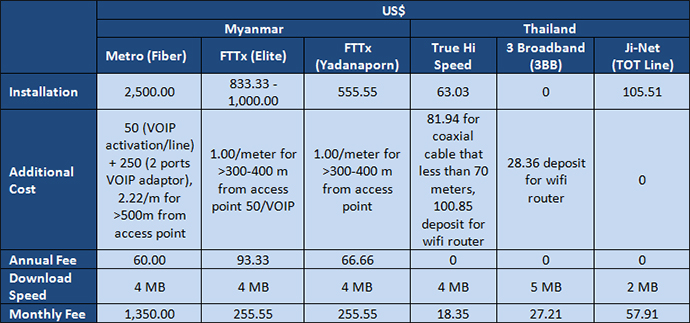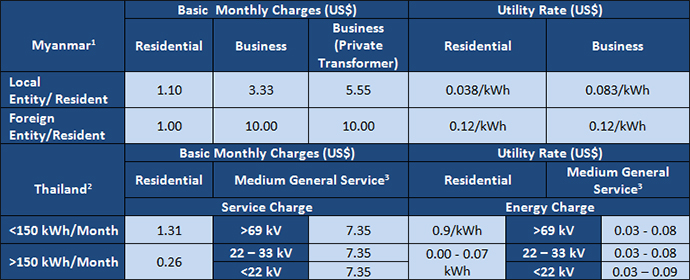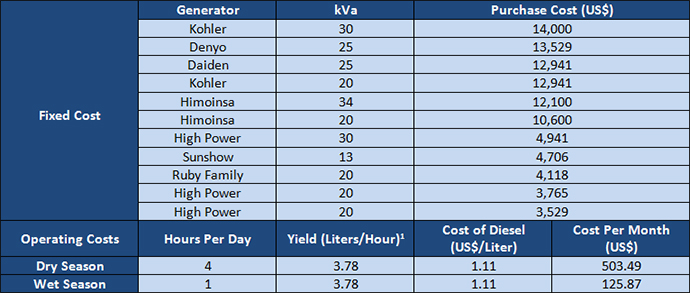Rising costs in Myanmar have been a frequent topic of conversations of late, in both board rooms and around dinner tables in Yangon’s burgeoning restaurants. The dramatic increase of new investors to Myanmar, soaring demand for office space in the commercial capital and limited supply of both soft and hard infrastructure has meant prices completely out of sync with historical norms.
Exacerbating challenges posed by the supply and demand gaps for many of the inputs required to feed growing interest in Myanmar has been the limited information about prevailing market prices. The cost of accommodation, salaries and SIM cards, available only on the secondary market, have varied wildly as new investors struggle to understand what the market clearing price is and sellers test the limits of what the market will bear.
Over the last three months, Tractus Asia, a US business advisory firm with offices in Myanmar and across the region, has carried out a study of the basic costs of doing business in the country. The research looked at costs ranging from commercial and industrial real estate to long distance telephone calls, salaries and taxes. The study is a product of more than 100 interviews with local and foreign companies, service providers, government officials and other informed sources. While every effort was made to ensure the data presented is reliable and accurate at the time the report was written, the rapid pace of change in the Myanmar economy may result in differences with those experienced by others.
Labor and Compensation
Wages and salaries have been among the most rapidly escalating costs of doing business in Myanmar. In Yangon, the commercial capital, university educated managers and professionals, such those working in research, sales or distribution teams, for international NGOs and professional employees such as lawyers, accountants and engineers with five years of experience are earning base salaries averaging about US$1,388 per month compared to US$2,398 in Thailand. Salaries for a given position will vary widely depending on the industry sector and whether it is a Myanmar or multinational firm and the country of origin. Wages for unskilled and semi-skilled workers and factory operators have risen much more slowly with factory operators in industrial zones around Yangon reporting wage increases between 10 percent per year over the last two years. Base wages for unskilled factory workers average about US$59 per month compared to about US$208 per month in Thailand.

Source: Tractus Research
Real Estate
Skyrocketing real estate costs in Myanmar have been widely reported by local and international media. In Yangon, the highest quality office space in multi-story commercial office buildings is being rented for US$87.50 / m2 per month compared to about US$24 in Bangkok and its availability is extremely limited. Lower quality office space in low rise commercial buildings is available at more reasonable rates of about US$23 / m2 per month versus a little less than US$18 in Thailand for comparable space. Like high quality space in Yangon’s CBD, the availability of space in older, lower quality towers in Yangon is also quite limited. Outside of Yangon’s Central Business District (CBD), office space was reported as renting for about US$22.50 / m2 per month, compared to about US$19 in Bangkok for comparable space.

Source: Tractus Research
There is an even greater disparity in the cost of serviced apartments. Average rent is about US$78 / m2 per month in the CBD for a one-bedroom apartment, compared to about US$40 in Bangkok. Unlike office space, moving outside of the CBD has little impact on price in Myanmar with service apartments renting for about US$75 / m2 per month for a one-bedroom apartment near Inya Lake and US$33 for comparable space in Bangkok.

Notes:
Serviced apartments are at a premium in Myanmar as a function of extremely limited supply. None of the serviced apartments surveyed in the scope of this report had available apartments. Due to the limited number, only three quotes were used in the collection and calculation of rental rates.
B.R. = Bedroom
Source: Tractus Research
Average factory rentals, primarily for steel structure, single story buildings, tell a similar story with rents ranging from between US$2.40 and US$7.50 / m2 per month compared to US$3.81 and US$6.93 / m2 per month in Thailand. While these ranges are similar suggesting comparable facilities; this is far from reality. The quality of infrastructure within industrial zones in Myanmar is very poor. Zones have none of the even minimally required infrastructure (electrical supply, wastewater treatment, telecoms, roads, etc.) required for effective operations compared to their Thai counterparts.

Source: Tractus Research
Notes: 1 – Knight Frank Research 2013
Building costs are one area where Myanmar has a cost advantage over Thailand. The approximate cost for construction of a steel structure building with basic electrical work (exclusive of land, civil works and air conditioning) is about US$154 / m2 compared with US$271 / m2 in Thailand.
Notes:
Thailand’s data is based on cost of raw materials, labor, overhead and VAT; cost applicable only in Bangkok Metropolitan, excluding cost of sheet pile in construction process. Data for Myanmar is based on quotes for the construction of a steel structure building with basic electrical work and also excludes the cost of land & civil works, electrical switchgear and fit-out and air conditioning.
Source: Tractus Research
Communications
Over the last eighteen months there has been an improvement in the quality of telecommunications services, if not costs. Improvements to network infrastructure, the entrance of new Internet service providers and the release of additional mobile numbers (SIM cards) has meant more people have been able to connect and communicate. However, some costs remain extremely high and the reliability of all communications modes, while better than it was even last year, is inconsistent and the cause of endless frustration for investors and an impediment to economic growth. Fixed-line long distance calling rates range from US$0.90 to US$7.00 per minute compared to US$0.09 to US$1.45 in Thailand. Installation fees for fixed line telephones are also high at between US$700 and US$833 compared to US$108 to US$119 in Thailand. A limited supply of mobile telephone numbers means long waits for permanent numbers necessitating that investors and visitors rent numbers on a temporary basis. When numbers do become available, they come at a high cost. One has to buy a SIM card whose prices vary from US$200 for a CDMA card to US$222 for a GSM while in Thailand numbers are given away for free.

Notes: 1 – CAT 001 is the standard circuit-switched international call service
Source: Tractus Research
Prices for landline telephone and Internet access run over fiber optic cable, delivering maximum download speeds of 4 MB per second are also extremely high. Two service providers servicing Yangon charge US$256 per month and a third charges US$1,350 per month with installation costs ranging between US$556 and US$2,500. This compares with monthly rates of between US$18.50 per month and US$58 per month for comparable service in Thailand where installation is either free or at most about US$106. WiMax (wide area WiFi) services delivering similar speeds are priced more affordably at US$90 per month and US$444 for installation, but speed is limited to 2 MB per second.

Notes:
Data for Myanmar is for the highest speeds available.
Data for Thailand is for the most comparable Internet packages.
Source: Tractus Research
Electricity
The cost of electric power in Myanmar tells two stories. A review of applied utility rates suggests the cost of power is low at between US$0.038 – 0.083 per kWh for a Myanmar company, with the cost for residential service on the lower end of the range and business service on the upper end. This compares favorably to Thailand rates which range from US$0.03-0.09 per kWh.

Notes:
1 – Tractus Research
2 – Thailand Board of Investment
3 – Business, industrial, government institutions meeting certain energy usage restrictions
However, frequent blackouts caused by limited generation capacity and substantial losses through transmission and distribution and an overburdened grid mean most businesses are required to provide their own back-up power. Generators can cost anywhere between US$3,529 for a locally made 20 kVA gen set for a household or small office to US$14,000 for a foreign manufactured 30 kVA unit for a larger office or home. During the dry season, when blackouts are most frequent, operating costs for a 20 kVA generator can be up to US$503 per month when they need to be run for typically four hours per day when the power is out. During the wet season, when hydroelectric dams provide more power to the grid, operating costs fall to about US$126 per month when generator power is only needed for about one hour a day, increasing the effective cost of electricity to between US$0.20 and US0.30 per kWh.

Source: Tractus Research
Notes:
1 – Based on consumption estimates of a 20 kVA diesel generator or similar for residential use.
2 – Generator running times are based on Tractus estimates for Yangon Oct 2012 – September 2013 in Ma Yan Gone Township but could vary dramatically based on a range of conditions. Cost per month is based on 30 days of operation.
Conclusion
The costs of doing business are a fundamental factor in deciding where to locate and it’s imperative to have a clear understanding of what value you are getting for your money. The quality of services and goods being purchased can be very different from market to market and within markets, so a clear understanding of the costs and conditions in a particular location are important so that an apples-to-apples comparison can be made. Wages paid by international companies and organizations are dramatically higher than those paid by their local counterparts in many cases. Real estate costs also came in dramatically different even between similar properties in comparable areas. In these and other cases, dramatic disparities between prices paid for basic products and services is largely driven by a lack of reliable and up-to-date information about prevailing market rates. The full version of Tractus Asia’s “Pay to Play: Evaluating the Costs of Doing Business in Myanmar” details in greater depth and breadth the basic costs of doing business in emerging Myanmar and aims to provide a base of understanding for companies entering Myanmar. Those wishing to receive a copy off this complimentary presentation are invited to contact Joshua Brown, Consultant and Chief Representative (Myanmar) at Joshua.Brown@tractus-asia.com.